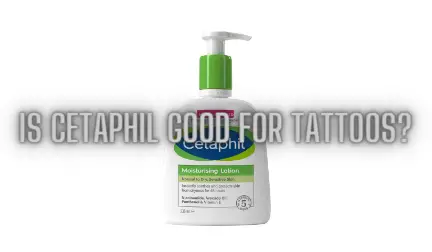Tattoos have transcended their historical roots to become a modern canvas of personal expression. However, for individuals with eczema, the journey to inked skin can be fraught with concerns. Eczema, a chronic skin condition characterized by dry, itchy, and inflamed skin, poses unique challenges when it comes to tattoos. In this context, skin care products like Cetaphil become especially relevant, offering a potential regimen to prepare and maintain eczema-prone skin before and after getting a tattoo.
Understanding Eczema and Its Impact on Tattoos
Eczema, also known as atopic dermatitis, affects the skin’s barrier function, making it more susceptible to irritation and infection. When considering a tattoo, this compromised skin barrier can present several risks, such as increased chances of infection, allergic reactions, and difficulty in healing. Therefore, the decision to get a tattoo must be made with careful consideration and preparation.
Pre-Tattoo Care for Eczema-Prone Skin
Before getting a tattoo, it’s essential to have your eczema under control. Flare-ups can not only affect the tattooing process but also the healing afterward. Here’s where a trusted skincare brand like Cetaphil comes in. Known for its gentle and hydrating products, Cetaphil offers cleansers and moisturizers that can help prepare eczema-prone skin for the tattooing process.
Moisturizing
Keeping the skin well-moisturized is crucial. Cetaphil’s line of moisturizers, particularly those designed for eczema-prone skin, can be used to hydrate the area intended for tattooing. This can help ensure the skin is in the best possible condition. It’s essential to choose fragrance-free and hypoallergenic options to minimize the risk of irritation.
Cleansing
Gentle cleansing is equally important. Cetaphil’s gentle skin cleansers can help remove potential irritants without stripping the skin of its natural oils. Ensuring that the skin is clean before the tattoo appointment can reduce the risk of infection.
The Tattooing Process
During the tattooing process, the skin is punctured thousands of times to deposit ink into the dermis. For someone with eczema, this can trigger a flare-up or worsen existing symptoms. To mitigate this:
- Choose an experienced tattoo artist: An artist familiar with tattooing eczema-prone skin will take extra precautions.
- Conduct a patch test: It’s a good idea to have a patch test done with the tattoo ink to check for potential allergic reactions.
- Discuss your condition: Inform your tattoo artist about your eczema. They might adjust their technique or provide specialized aftercare instructions.
Post-Tattoo Care with Cetaphil
After getting a tattoo, proper aftercare is essential to ensure appropriate healing, especially for those with eczema. Here’s where continued use of Cetaphil products can be beneficial.
Initial Healing
During the first few days, the tattooed area will need to be kept clean and protected. Using a Cetaphil gentle cleanser can help prevent infection without causing dryness or irritation. While some artists may recommend specialized tattoo aftercare products, many dermatologists suggest using simple, fragrance-free products like Cetaphil to avoid complications.
Ongoing Moisturization
As the tattoo heals, keeping the area moisturized is paramount. Cetaphil’s Eczema Calming Body Moisturizer is an excellent choice for this phase. It’s designed to soothe irritated skin and reinforce the skin’s barrier, which is essential for the healing tattoo on eczema-prone skin.
Long-term Care
Even after the tattoo has healed, individuals with eczema should continue to use gentle skincare products. Regular moisturizing can keep the skin healthy and may even help maintain the tattoo’s appearance.
Potential Risks and Considerations
While Cetaphil products can be incredibly beneficial for eczema-prone skin, it’s important to be aware of the potential risks associated with getting a tattoo in such conditions:
- Infections: Compromised skin has an increased risk of bacterial and fungal infections.
- Allergic reactions: Even with hypoallergenic products, there’s a possibility of reacting to tattoo ink or aftercare products.
- Inflammation and flare-ups: The trauma from tattoo needles can cause eczema to flare.
- Color distortion: Eczema-affected skin might not hold tattoo ink as well, leading to faded or blurred tattoos.
Working with Dermatologists and Tattoo Artists
It’s recommended to consult with a dermatologist before getting a tattoo. They can provide advice on how to manage your eczema and whether or not a tattoo is advisable. Additionally, a collaborative approach with the tattoo artist can ensure that both the artisticand medical considerations are addressed. An artist who understands the complexities of tattooing over eczema-prone skin can be an invaluable partner in your tattoo journey.
Final Thoughts
Tattoos can be a beautiful form of self-expression, but they require extra caution for those with eczema. Products like Cetaphil can play a significant role in preparing and maintaining the skin before and after getting a tattoo. By engaging in diligent skincare routines, choosing the right tattoo artist, and involving healthcare professionals, individuals with eczema can enjoy tattoos while keeping their skin healthy.
In conclusion, tattoos and eczema can coexist with the right care and precautions. Cetaphil’s commitment to gentle, skin-friendly products can be an integral part of the solution, helping to navigate the complex interplay between skin art and sensitive skin conditions. With a balanced approach to skincare and tattoo aftercare, the dream of having a tattoo doesn’t have to be out of reach for those living with eczema.


